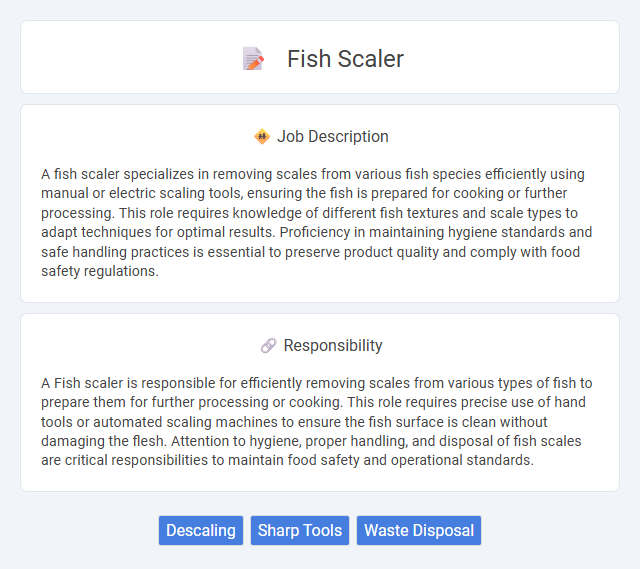
A fish scaler specializes in removing scales from various fish species efficiently using manual or electric scaling tools, ensuring the fish is prepared for cooking or further processing. This role requires knowledge of different fish textures and scale types to adapt techniques for optimal results. Proficiency in maintaining hygiene standards and safe handling practices is essential to preserve product quality and comply with food safety regulations.
Fish scaler jobs likely demand good hand-eye coordination and physical stamina due to repetitive scraping motions and standing for long periods. Individuals with arthritis or hand injuries may find this role challenging or unsuitable because of the strain involved. Those comfortable with manual labor in wet and cold environments are probably a better fit for this position.
Qualification
A fish scaler must possess keen attention to detail and manual dexterity to efficiently remove scales without damaging the fish. Experience working with seafood processing equipment and knowledge of hygiene standards are essential qualifications. Physical stamina and the ability to work in cold, wet environments also contribute to successful job performance.
Responsibility
A Fish scaler is responsible for efficiently removing scales from various types of fish to prepare them for further processing or cooking. This role requires precise use of hand tools or automated scaling machines to ensure the fish surface is clean without damaging the flesh. Attention to hygiene, proper handling, and disposal of fish scales are critical responsibilities to maintain food safety and operational standards.
Benefit
A fish scaler job likely offers benefits such as improving hand-eye coordination and manual dexterity due to the repetitive nature of the task. Employees may also experience the advantage of working in a team-oriented environment, which could enhance communication skills and foster camaraderie. There is a probable benefit of gaining industry-specific knowledge that might open pathways to other roles in seafood processing or quality control.
Challenge
Fish scaler jobs likely involve the challenge of handling slippery and delicate fish surfaces which require precision to avoid damaging the product. Workers may probably face repetitive motion tasks that demand consistent attention to prevent fatigue and maintain efficiency. The risk of injury from sharp tools and the need to work quickly in cold, wet environments might also present notable difficulties.
Career Advancement
A fish scaler's role involves removing scales from fish efficiently to prepare them for processing or sale. Mastery in fish scaling can lead to career advancement opportunities such as supervisory positions, quality control roles, or specialized processing technician jobs in seafood processing plants. Developing expertise in handling various fish species and familiarity with automated scaling equipment enhances job prospects and career growth in the seafood industry.
Key Terms
Descaling
Fish scalers specialize in the precise removal of scales from various fish species, ensuring the skin is clean and ready for cooking or further processing. Using manual or automated descaling tools, they carefully strip scales without damaging the delicate fish flesh, maintaining quality and appearance. Mastery of efficient descaling techniques directly impacts product yield and consumer satisfaction in seafood industries.
Sharp Tools
Fish scalers rely on sharp tools to efficiently remove scales without damaging the fish's skin, ensuring quality and minimizing waste. Precision-engineered blades and ergonomic handles enhance control and reduce strain during repetitive scaling tasks. Maintaining tool sharpness is crucial for productivity, safety, and achieving consistent, clean results in fish processing.
Waste Disposal
Fish scalers specialize in efficiently removing scales from fish while managing the resulting waste through proper disposal techniques. Effective waste disposal in fish scaling involves segregating organic scales from non-organic materials, ensuring environmentally safe disposal or recycling options. Adhering to local regulations on fish waste management reduces environmental impact and maintains workplace hygiene.
 kuljobs.com
kuljobs.com